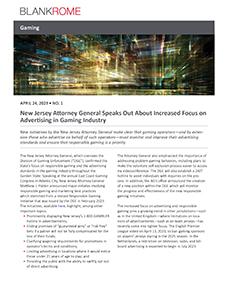New Jersey Attorney General Speaks Out About Increased Focus on Advertising in Gaming Industry
New initiatives by the New Jersey Attorney General make clear that gaming operators—and by extension those who advertise on behalf of such operators—must monitor and improve their advertising standards and ensure that responsible gaming is a priority.
The New Jersey Attorney General, which oversees the Division of Gaming Enforcement ("DGE"), confirmed the State’s focus on responsible gaming and the advertising standards in the gaming industry throughout the Garden State. Speaking at the annual East Coast Gaming Congress in Atlantic City, New Jersey Attorney General Matthew J. Platkin announced major initiates involving responsible gaming and marketing best practices which stemmed from a revised Responsible Gaming Initiative that was issued by the DGE in February 2023. The initiatives, available here, highlight, among other important topics:
- Prominently displaying New Jersey’s 1-800-GAMBLER hotline in advertisements;
- Ending promises of “guaranteed wins” or “risk-free” bets if a patron will not be fully compensated for the loss of their funds;
- Clarifying wagering requirements for promotions in operator's terms and conditions;
- Limiting advertising in locations where it would entice those under 21 years of age to play; and
- Providing the public with the ability to swiftly opt out of direct advertising.
The Attorney General also emphasized the importance of addressing problem gaming behaviors, including plans to make the voluntary self-exclusion process easier to access via videoconference. The DGE will also establish a 24/7 hotline to assist individuals with inquiries on the process. In addition, the AG's office announced the creation of a new position within the DGE which will monitor the progress and effectiveness of the new responsible gaming initiatives.
The increased focus on advertising and responsible gaming joins a growing trend in other jurisdictions—such as in the United Kingdom—where limitations on locations of advertisements—such as on team jerseys—has recently come into tighter focus. The English Premier League voted on April 13, 2023, to ban gaming sponsors on players’ jerseys staring in the 2025 season. In the Netherlands, a restriction on television, radio, and billboard advertising is expected to begin in July 2023.
Similarly, a focus on limiting advertising toward young, vulnerable, and self-excluded people has gained traction in the United States in recently launched jurisdictions, such as Massachusetts and Ohio. The Commonwealth of Massachusetts’ new regulations prohibit advertisements tailored as “free,” “cost free,” or “free of risk” opportunities where a player can incur any loss or risk of their own money. See 205 CMR 256.04. On March 28, 2023, the Massachusetts Gaming Commission ("MGC") issued requirements for advertising to include responsible gaming and Massachusetts Department of Public Health language. In Ohio, the Ohio Casino Control Commission (“OCCC”) prohibits targeting individuals under the age of 21 and advertising on college campuses in the State. See Ohio Adm. Code 3775-16-08(B) and (E). Similar to the DGE and the MGC, the OCCC, ahead of Ohio’s January 1, 2023, launch, issued a memorandum to operators to ensure all advertising requirements were followed.
Responsible gaming regulation is evolving across the United States. It is expected that other U.S. regulators will continue to address these issues in the near future and continue to look for new ways to achieve responsible gaming goals. Should you have any questions about the impact of these new initiatives in Massachusetts, New Jersey, Ohio, or elsewhere, please contact Dennis M.P. Ehling, Stephen D. Schrier, Michael P. Trainor, Gregory A. Bailey, or another member of Blank Rome's Gaming group.


